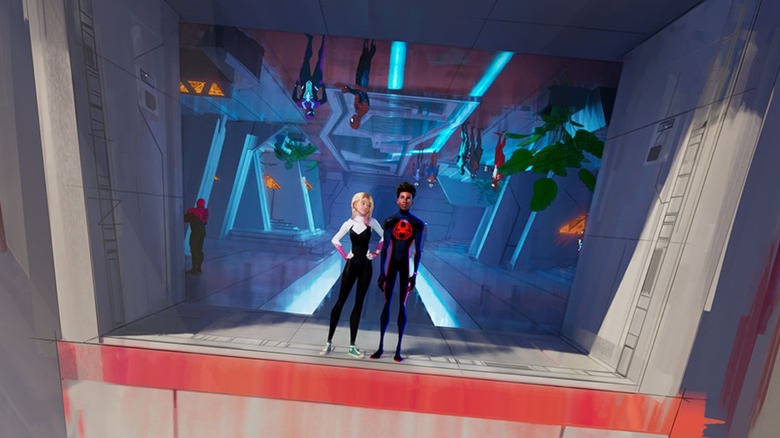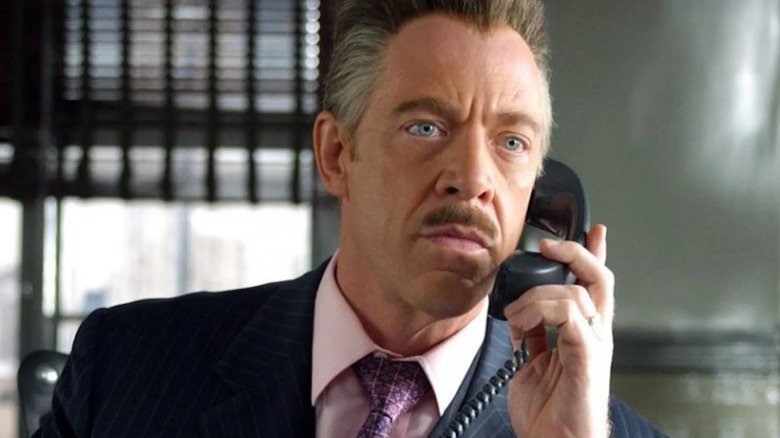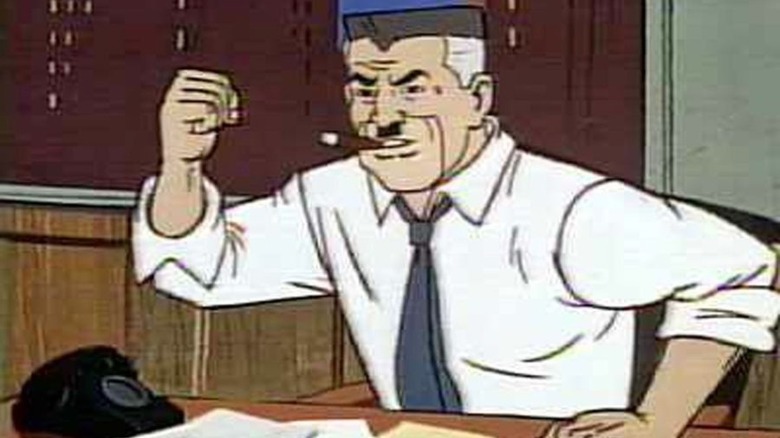One Of The Most Amusing Spider-Man Across The Spider-Verse Cameos Deserves A Deep Dive
The new animated film "Spider-Man: Across the Spider-Verse" is going to aggravate hunters of Easter eggs. The sheer overwhelming volume of Spider-Man references, callbacks, and cameos will cause even the most stalwart, deep-cut Marvel Comics fan to go a little cross-eyed. There is a hilarious moment when Miles Morales (Shameik Moore) arrives at an interdimensional Spider-Man headquarters, populated entirely by thousands of Spider-People from other dimensions, and the camera pans over a crowd of them, introducing each with a miniature on-screen chyron. In the span of about four seconds, about a hundred chyrons speed past the audience's eyes. Sorry, Easter egg hunters. We're deliberately giving you more information than your brain can process.
Throughout the hundreds of Spider-Cameos, however, there is going to be one most people might recognize. As the various Spider-People speed through various dimensions, one might catch a glimpse of background TV screens and news broadcasts, depicting the media's prevailing attitude toward that dimension's Spider-Man. The newscaster is, naturally, J. Jonah Jameson, the gruff, Spider-Man-hating newspaper editor that the original Peter Parker worked for in the comics. Jameson, sometimes called JJJ, is voiced by J.K. Simmons, the actor who first played the part in Sam Raimi's 2002 "Spider-Man" film and who has returned several times since.
It seems that in any dimension, JJJ is the same character, and he will always look and sound like Simmons. Spider-Man can be just about anyone, including a pregnant woman, a punk rocker, a brooding '90s guy, a cat, a dinosaur, or even a car. JJJ, meanwhile, is J.K. Simmons throughout the multiverse.
There is, of course, something very comforting about that.
A tall glass of Jameson
In Sam Raimi's three Spider-Man movies, Simmons was encouraged to play J. Jonah Jameson as over-the-top and even a little bit cartoonish. He was always at the end of his tether, constantly angry that the menace Spider-Man was out there running amok. He captured the look and the comedic wrath of the character as he was typically presented in Marvel Comics. He became a beloved and indispensable part of the film series. Those who were around in 2003 and 2004 might recall that Tobey Maguire was contemplating leaving the "Spider-Man" movies and that Jake Gyllenhaal was poised to take over. That re-casting would have been tolerated by the fans of Raimi's movie, and would not have harmed the glorious "Spider-Man 2." Recasting JJJ, however, would not have been acceptable. Simmons too closely embodied the character.
Indeed, years later, after the "Spider-Man" film series had been rebooted for a second time, there seemed to be only one choice for Jameson. In the Marvel Cinematic Universe film "Spider-Man: Far From Home," Jameson — once again played by Simmons — appeared on a TV to announce that he knew the actual secret identity of Spider-Man. No longer a newspaperman, this new Jameson seemed to have a career as a TV anchor. His attitude remained the same. In the following film, "Spider-Man: No Way Home," It was further seen that JJJ was more of a half-crazed, Alex Jones-type conspiracy theorist ... which makes perfect sense. The modern version of the kooky, conspiracy-spreading 1960s journalist might very well be a not-at-all-credible-yet-somehow-popular twit like Jones.
One Jameson, two dimensions. "Across the Spider-Verse" now makes it three.
Get me pictures of Spider-Man!
Simmons has always been game to return to the role of J. Jonah Jameson. In addition to the MCU movies, Simmons also had a brief cameo in "Venom: Let There Be Carnage," playing his MCU version of the character. After playing the part in Raimi's movies, Simmons also provided the character's voice for the 2007 video game version of "Spider-Man 3." If you have been lucky enough to play the Spider-Man pinball machine, you might also notice that Simmons recorded some original dialogue for it. Jameson, it seems, is a multiverse unto himself.
This is especially true now that he's part of the animated "Spider-Verse" movies. Indeed, his presence might even be more than a cute cameo. One of the central themes of "Across the Spider-Verse" is that a certain series of events needs to occur in order to create a Spider-Man. Spider-Man 2099 (Oscar Isaac) points out the fatalistic nature of a superhero origin story, content to allow hundreds of Uncle Bens to die in order to create hundreds of Spider-Men in exchange. This would also imply that Spider-Man is also working for a blowhard JJJ in every universe as well. A mean, conspiracy-mongering boss is not just part of Peter Parker's everyday life, but a vital part of the fabric of the Spider-Verse. Without a cigar-chomping a-hole banging on his desk, yelling "Get me pictures of Spider-Man!", is Spider-Man even complete?
It seems not. Just like the death of Uncle Ben, the peril of Gwen Stacy, and the adoration of Mary-Jane, JJJ is integral to making a hero a hero. Even for Miles Morales, who is being raised by his parents and not by an Aunt May figure, JJJ is present. Sooner or later, Spider-Man will have a crappy boss.


